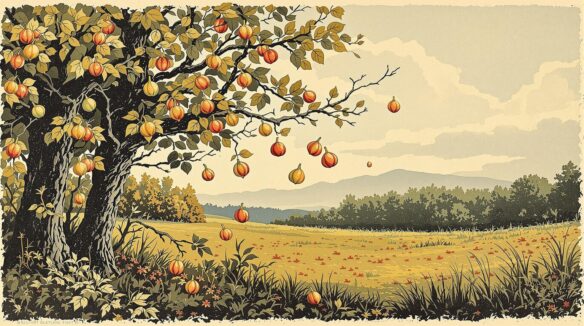In this chapter, Zarathustra addresses his companions during an autumn afternoon on the idyllic Blessed Isles.
Zarathustra uses the metaphor of ripe figs falling from trees to represent the maturity and richness of his teachings. As the figs burst open upon falling, so his lessons are ready to be received and absorbed by his friends. He invites them to partake in the wisdom he offers, emphasizing the abundance and fullness of the moment.

The figs are falling from the trees, they are good and sweet; and as they fall, their red skins burst. A north wind am I to all ripe figs. And thus, like figs, these teachings fall to you, my friends: now drink their juice and their sweet flesh!
Zarathustra challenges traditional notions of God, referring to God as a supposition (“Gott ist eine Muthmaassung”) and questioning the value of conjectures that extend beyond human creative will. He urges his listeners to focus on what they can create and become themselves rather than relying on the idea of divine beings. While they may not become the Übermensch personally, they can transform themselves into predecessors of the Übermensch, contributing to its eventual realization.
Zarathustra emphasizes the importance of creation and the transformative process it entails. He speaks of the necessity of suffering and metamorphosis in the act of creation, comparing the creator to both a child being born and a mother experiencing the pains of childbirth.
Throughout his reflection, Zarathustra recounts his own experiences of transformation and farewell, alluding to the many “souls” and “birth pangs” he has endured. This personal journey underscores the continual process of becoming and the sacrifices inherent in striving towards higher ideals.
He critiques static and eternal concepts, rejecting teachings that promote notions of an unchanging, everlasting reality. Such ideas, he argues, distort and undermine the value of the temporal world and human experience. Instead, Zarathustra advocates for a celebration of time and becoming, viewing transience as something to be affirmed rather than denied.
